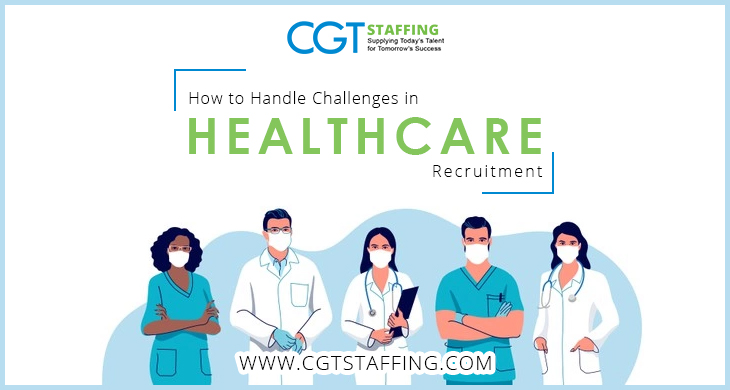The healthcare industry has experienced momentous growth as a result of technological advancements. In addition to doctors, nurses, and other healthcare personnel, a modern hospital has a comprehensive support staff comprised of administrators, network engineers, developers, and others, each critical to the overall success of the operation. As such, healthcare recruitment has seen a seismic shift, increasingly favoring employees rather than employers. In spite of these challenges, healthcare management recruiters have to learn how to manage the recruitment process more efficiently.
This blog explores this evolution.
Table of Contents
The Importance of Structured Healthcare Recruitment Strategies
There is a gap between the demand for competent healthcare talent and the number of active and passive healthcare candidates in the job market. This has prompted workforce managers and healthcare staffing agencies to accelerate their recruitment processes. Increasingly, recruiters have turned to the use of advanced tools and metrics to optimize these efforts; this has been a catalyst for change in the healthcare industry.
The healthcare industry has transformed its interactions with its customers and stakeholders alike. This includes how modern healthcare organizations interact with active and passive candidates. The ongoing changes and advancements in the industry continue to demand an agile and responsive approach to recruitment. Consumer-centric economies have evolved to become talent-centric thanks to the evolution in things like smartphones, software applications, and even digital recordkeeping.
While there is no definitive method for forecasting the workings of the healthcare industry a decade from now, one thing is certain – the marketplace will continue to evolve, and this, in turn, will require continual refinement of healthcare recruitment strategies.
Modern Healthcare Recruiting Tips
According to the US Bureau of Labor Statistics, the employment rate in the healthcare industry continues to experience an exponential growth curve. According to the Bureau, employment will expand by up to 19% by 2024. In absolute terms, this is markedly faster growth than many other industries.
Technology has played a considerable role in the advancement of the medical marketplace in recent years. It has triggered an increased demand for more advanced, and in some cases, entirely new jobs and skills. In fact, the Bureau of Labor Statistics estimates that as many as 2.3 million new healthcare jobs will be created by 2024. To remain both solvent and relevant in the midst of such heavy growth patterns, modern healthcare organizations have increasingly sought to source and retain talent with technological skills. Below are a few healthcare recruitment tips you can use to make your recruitment process more efficient:
Working on Your Employer Brand
These days, there are several recruitment platforms that you can leverage to create a stronger employer brand. An employer brand is defined as the reputation and perception an organization embodies within the job market. A strong employer brand translates to attracting a better tier of talent for your business. This is something every hiring manager should concentrate on in recruitment for healthcare.
Leveraging Social Media Hiring
Social media offers a unique opportunity to tap into a large pool of talent. Platforms like Facebook, Instagram, LinkedIn, and others already have billions of active users. That means you can leverage it as a tool to make your healthcare recruitment efforts more effective. Most healthcare professionals do not have the time to search for prospective new employers. Even for those that do, there is no guarantee they will find your business. Leveraging audience segmentation on social media platforms, you can target specific audiences, making sure your job ads and employer brand alike garner increased visibility.
Using an Incentivized Referral Program
Referral programs are an easy and effective way to quickly source talent for open positions. However, motivating your current employees to refer you to others as an employer is not always easy. You may have to consider an incentive program to encourage employees to tap into their own professional networks.
Creating a Better Candidate Experience
With a high demand for specific skills and a limited talent pool to satisfy this overwhelming demand, candidates have become increasingly discriminating, often with the benefit of several employment options from which to choose. While this is ideal for candidates, employers are faced with a dilemma, seeking to positively engage candidates in order to influence their career decisions. Offering a better candidate experience than your competition is one way to ensure you attract the best talent. Analyze all the steps in your hiring process, and work on modifying them to improve the candidate experience your organization offers.
Optimizing Your Career Site
One of the most overlooked areas and one that can yield immediate results to your own healthcare recruitment process is the optimization of your website’s careers page. Your careers page is one of the most efficient ways to get more applicants for an open position. The page is a prime digital space to showcase your company culture, values, and objectives. Optimizing your website to target specific candidate personas can lead to a better quality of talent over time.
Conclusion
The biggest challenge within the healthcare industry is that there is not enough talent to go around. With a consistently high demand for certain advanced skills. Candidates always have options to choose from when applying for a role in the healthcare industry. What this means for employers is the need to adapt, innovating new recruitment techniques to make sure they keep attracting the best talent. Using all modern tools at your disposal and optimizing your process, you can start hiring and retaining better candidates.
